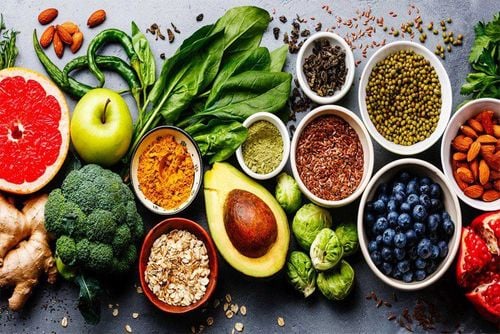This is an automatically translated article.
Sweet potato is a familiar, necessary and very good food for children, especially children in the weaning age. Children who eat sweet potatoes will be provided with nutrients as well as vitamins and minerals that are good for the body. However, children should not eat sweet potatoes often and often. Eating too much or too little of any food will be harmful to human health.
1. What are the benefits of eating sweet potatoes for children?
Sweet potato is a familiar, necessary and preferred food by many people. Sweet potatoes not only have a delicious taste but are also very good for the health of children, especially children in the weaning age.
In 100g of sweet potato, there are many nutrients such as protein, starch, fat, fiber, and many vitamins and minerals with a similar ratio. In particular, the micronutrient content of sweet potatoes is many times higher than that of other foods.
The nutritional value of sweet potatoes includes:
Sweet potatoes contain a lot of vitamin A and beta-carotene: Orange-yellow sweet potatoes are rich in vitamin A, an important nutrient for eye development. Good for children's health. Not only that, sweet potatoes also contain a lot of beta - carotene, which is a precursor of vitamin A, which will provide the body with a large amount of vitamin A. Therefore, it is completely okay for parents to feed their children sweet potatoes during the weaning period. respectable. Sweet potatoes are rich in starch: Sweet potatoes are rich in starch (carbohydrates), so they will give children an abundant source of energy, helping them to play all day without worrying about losing their strength. Sweet potatoes are rich in fiber: Sweet potatoes also contain a lot of fiber, which is very good for the digestive system of children. Feeding sweet potatoes to children will add the necessary amount of fiber, helping to cure constipation for children. On average, 100 grams of peeled cooked sweet potatoes contain about 3.9 grams of fiber. In addition, for children with constipation, eating sweet potatoes also improves intestinal health as well as digestive problems. Sweet potatoes are rich in vitamins: In addition to vitamin A, sweet potatoes also contain many vitamins that are good for children's health such as vitamins of group B (B1, B2, B3, B9) that support the metabolism of substances. nutrition and strengthen the body's immune system; vitamin C helps to improve resistance and anti-oxidant very well; vitamin E enhances memory and strengthens hair and skin; Vitamin K helps keep bones strong and aids blood clotting. The vitamins in sweet potatoes will help the organs in the child's body develop healthy. Sweet potatoes are rich in minerals: Sweet potatoes are very rich in minerals. Children who eat sweet potatoes will be provided with iron, folate, calcium, zinc, magnesium, potassium, manganese, and phosphorus. These minerals help the metabolic processes in the baby's body take place smoothly, creating good conditions for the body to grow and develop. With a high content of nutrients and an abundance of types, colors as well as a variety of dishes for children, sweet potatoes have become a preferred food choice. In particular, for children in the weaning age, sweet potato dishes also bring a lot of benefits to children's health such as:
Using sweet potatoes as a main snack for children will help their body develop. good, especially the eyes and brain. The high content of micronutrients in sweet potatoes will help children strengthen their resistance and support the metabolism in the body. Due to the high fiber content, sweet potato is a food that supports the digestive system and is extremely effective in treating constipation for children. Sweet potatoes are easy to eat, have a sweet taste, so children love them. There are many types of sweet potatoes with different colors that will stimulate children's vision, increase interest and appetite when eating. Dishes made from sweet potatoes are simple, easy and quick to prepare.

Bố mẹ cho trẻ ăn khoai lang trong giai đoạn ăn dặm là hoàn toàn đúng đắn
2. Is it good for children to eat a lot of sweet potatoes?
Sweet potatoes are rich in nutrients, especially vitamin A and beta - carotene to help your baby's eyesight and fight disease-causing bacteria; Fiber and vitamins support the digestive system, stimulate bowel movements, prevent constipation. Therefore, many nutritionists recommend that you add sweet potatoes to your daily diet to help children grow healthy.
But children should not eat sweet potatoes much and often. Children's meals, especially those in the weaning age, need to be full and balanced with 4 important groups of nutrients. Eating too much or too little of any substance will be harmful to health. Similarly, if parents feed their children sweet potatoes too much and often, it will affect the child's development. The reason is because:
Sweet potatoes also contain a lot of starch but not like rice. The starch in sweet potatoes will increase the secretion of gastric juice in the digestive system, causing children to have heartburn, bloating, abdominal distension, and intestinal boiling. For children with diabetes, it is absolutely necessary not to eat sweet potatoes on an empty stomach because it will make the disease worse. Sweet potatoes contain a lot of fiber, so it is very good for the digestive system of children, but if you eat too much and often, it will lead to protein deficiency. Not only that, if you consume too much fiber in sweet potatoes, it will increase the absorption of minerals, making the body of young children lack nutrients, which can cause weakness in the body. Therefore, children should only eat about 100 grams of sweet potatoes a day. In addition to feeding sweet potatoes to children, parents need to pay attention to adding green vegetables and fruits to the diet at each meal and make milk with enough water according to the instructions. In particular, the main food source of children is still rice, beans and potatoes are just an accompanying agricultural product because the nutritional content cannot be equal to rice.

Trẻ ăn khoai lang sẽ được cung cấp các chất dinh dưỡng cũng như các vitamin và khoáng chất tốt cho cơ thể
3. How to choose and store sweet potatoes correctly
If the sweet potato is not stored properly, it is easy to sprout. At this time, the content of nutrients in sweet potatoes is not only lost but also converted into substances that are harmful to health. Therefore, to maximize the absorption of nutrients in sweet potatoes, parents need to know how to choose and store sweet potatoes properly.
When choosing to buy sweet potatoes, you should choose those that have a uniform outer skin color, are not chipped, scratched or cracked, are not bruised, feel firm and heavy in the hand. Avoid buying sweet potatoes that are pitted or black as this is a sign that the sweet potato has rotted or damaged. Buy sweet potatoes from trusted stores, avoid buying sprouted sweet potatoes. After buying sweet potatoes, if stored in the refrigerator, they need to be washed first, drained and kept for about 5-7 days. However, there is no need to store sweet potatoes in the refrigerator, just keep them in a dry place at room temperature and it is best to use them up within 7 days. If you want to keep it longer, keep the outer layer of soil intact, place the potatoes in a cool, dry and dark place at about 15oC. However, don't leave the sweet potatoes out for more than a month. In short, children who eat sweet potatoes will be provided with nutrients as well as vitamins and minerals that are good for the body. However, children should not eat sweet potatoes often and often. Eating too much or too little of any food will be harmful to human health.













